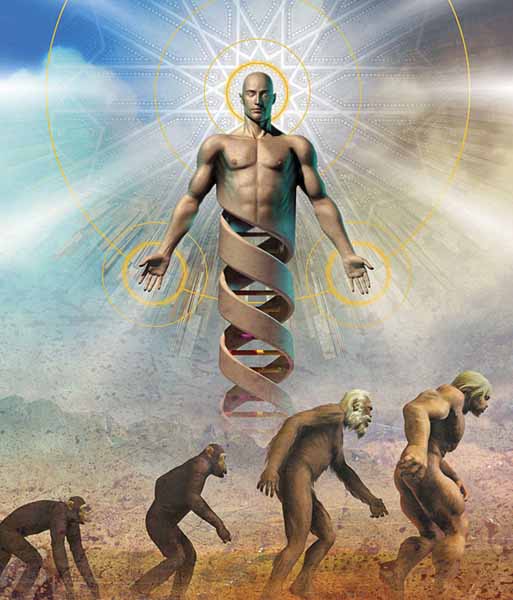2:26 AM My Response To Richard Dawkins' "Gods & Earthlings" and Rebuttle |
 OK, so this is a bit late, but i had a school project to formulate an argument against these two articles in my philosophy class and i thought i would share them. The following are (in order) Dawkins' original article (blue writing), LaSor's rebuttle (green writing), and my response (black writing): Gods and earthlings April 18, 2008 If we were visited by aliens from a distant planet, would we fall on our knees and worship them as gods? The difficulty of getting here from even our nearest neighbor, the red dwarf star Proxima Centauri, constitutes a filter through which only beings with a technology so advanced as to be god-like (from our point of view) could pass. The capabilities and powers of our interstellar visitors would seem more magical to us than all the miracles of all the gods that have ever been imagined by priests or theologians, mullahs or rabbis, shamans or witch doctors. Arthur C. Clarke, who died last month, said, "Any sufficiently advanced technology is indistinguishable from magic." If we could land a jumbo jet beside a medieval village, would we not be worshiped as gods? The technology of interstellar travel, and the scientific knowledge on which it would be based, are as far beyond us as our present-day knowledge surpasses that of Dark Age peasants. Parting the Red Sea -- or splitting the moon in two as Muhammad is alleged to have done -- would be child's play to those who command forces powerful enough to propel them from star to star. But now the question arises: In what sense would the god-like aliens not be gods? Answer: In a very important sense. To deserve the name of God, a being would have to have designed more than just a jumbo jet or even a starship. He would have to have designed the universe. And therein lies a fundamental contradiction. Entities capable of designing anything, whether they be human engineers or interstellar aliens, must be complex -- and therefore, statistically improbable. And statistically improbable things don't just happen spontaneously by chance without an explanation trail. That is what "improbable" means, as creationists never tire of assuring us (they wrongly think Darwinian natural selection is a matter of chance). In fact, natural selection is the very opposite of a chance process, and it is the only ultimate explanation we know for complex, improbable things. Even if our species was created by space alien designers, those designers themselves would have to have arisen from simpler antecedents -- so they can't be an ultimate explanation for anything. No matter how god-like our interstellar aliens may be, and no matter how vast and wonderful their starships, they cannot have designed the universe because, like human engineers and all complex things, they are late arrivals in it. Intelligent design "theorists" (a misnomer, for they have no theory) often use the alien scenario to distance themselves from old-style creationists: "For all we know, the designer might be an alien from outer space." This attempt to fend off accusations of unconstitutionally importing religion into science classes is lame and disingenuous. All the leading intelligent design spokesmen are devout, and, when talking to the faithful, they drop the science-fiction fig leaf and expose themselves as the fundamentalist creationists they truly are. Nevertheless, despite their notorious dishonesty, I sometimes hand an olive branch to these people by pretending to take their "space aliens" political ploy seriously. Unrealistic as the space alien theory is, it constitutes intelligent design's best shot. The distinguished molecular biologists Francis Crick and Leslie Orgel advanced a version of the notion, probably tongue in cheek, called "Directed Panspermia." Life, they argued, could have been "seeded" on the early Earth by a spacecraft packed with bacteria. Maybe little cellular machines like the bacterial flagellar motor were designed by ingenious nano-technologists from Betelgeuse. But you still have to explain the prior existence of the Betelgeusians and how they became so advanced and god-like. Even if Betelgeusian life was, in turn, seeded by another rocket from Aldebaran 4 billion years earlier, eventually we have to terminate the regress. We need a better explanation, such as evolution by natural selection or an equally workable account of the painstaking R&D that must underlie complex, statistically improbable things. Gods, if they are complex enough to be capable of designing anything, are, by virtue of their very complexity, not in a position to design themselves. Theologians attempt two (mutually incompatible and pathetically inadequate) answers to this unanswerable point. Some say their God is not complex but simple. This obviously won't wash. No simple god could design bacterial flagellar motors or universes, let alone forgive sins or impregnate virgins. Presumably recognizing the justice of that, other theologians go to the opposite extreme. They admit that their god is complex but assert that he had no beginning: He was always there and always complex. But if you are going to resort to that facile cop-out, you might as well say flagellar motors were always there. You cannot have it both ways. Visitations from distant star systems are improbable enough to attract ridicule, not least from the advocates of intelligent design themselves. A creator god who had always existed would be far more improbable still. This technique of arguing against a theory by setting up its most plausible version and dismissing it is commonly used in science and philosophy. The late, great evolutionist John Maynard Smith used it in his 1964 attack on the then-popular theory of "group selection." He set himself the task of devising the best possible argument for group selection. The details don't matter; he called it the Haystack Model. He then proceeded to show that the assumptions that the Haystack Model needed to make were highly unrealistic. Everybody understood that this was an argument against group selection. Nobody twisted it to trumpet to the world, "See? Maynard Smith believes in Group Selection after all, and he thinks it happens in Haystacks, ho ho ho!" Creationists, by contrast, never miss a trick. When I have raised the science-fiction olive branch to try to argue against them, they have twisted it -- most recently in a movie scheduled to open this week -- in order to proclaim loudly, "Dawkins believes in intelligent design after all." Or "Dawkins believes in little green men in flying saucers." Or "Dawkins is a Raelian." It's called "lying for Jesus," and they are completely shameless. Dawkins argues that "intelligent design" is not science. He is correct. But after that, he moves into less certain territory in which his reasoning inevitably moves to the problem of first causes. There he pretty much avoids the details. In the end, he, like everyone else, must confront one of two choices: Either the universe has always existed, or it was created by someone who has always existed. If the latter is improbable, as he claims, then why is not the former also? Without saying so explicitly, he clearly favors the former, which he is free to do. Nonetheless, it would be interesting to know why he favors one and not the other. Could it be that the latter might make moral claims on all of us, something that would threaten our desire to be morally autonomous? William S. LaSor My Response: In a Los Angeles Times article, renowned Atheist philosopher Richard Dawkins brings up some fantastic points about theories of intelligent design being flawed. He brings up the new aged theory of space aliens being the creators of life on planet earth and exposes them as fundamentalist creationists. Conversely, William S. LaSor, a resident of Apple Valley, California, brings up quite relevant points in response to Dawkins’ article. Overall I feel that both writers, though undeniably eloquent, have somewhat flawed arguments. One of the stronger arguments frequented by Atheists against creationist theory is the issue of the origins of the creator. Whether the alleged creator is a sole divinity or a group of extraterrestrials, we must ask ourselves, what created them? It is apparent that for them to exist something must have existed prior in order to have created them. An educated creationist would justify his alleged creator’s existence by discussing theoretical but ultimately non-provable arguments of how this creator could have created everything, even going as far as accepting evolution as compatible with theories of creation as many have done in the Creation-Evolution Controversy. In spite of these somewhat more logical explanations from creationists, Atheists still rebut their claims. These same Atheists, however, when given a chance to explain what they believe often explain a universe in which nothing previous existed, creating the exact same problem that creationist theory runs into. They then often proceed to justify their beliefs by citing the theory of natural selection, claiming it to be the ultimate explanation and asserting their views in an elitist fashion, resulting in a proverbial chicken versus egg debate. Though I strongly agree with Dawkins’ main points, his argument is flawed in the same manner that the common Atheist argument is – he is unable to answer the question “what is the origin of everything?” and he doesn’t even get closer to the answer than the best creationist theory. He simply states that natural selection is the ultimate answer and gives no proof as to why he is justified in feeling this way. One of the highlights of the LaSor article is that he picks up on this and, intrigued, asks Dawkins if he would care to elaborate. I felt LaSor’s rebuttle of Dawkins’ article was an admirable approach, but overall the article was still somewhat erroneous. LaSor starts by agreeing with Dawkins that intelligent design isn’t science, but he then questions Dawkins on why he feels his ideologies are superior to those of the creationists without elaborating on the evidence he has to back his claims. I felt this was a good move on LaSor’s part, but after this LaSor made a grave mistake; he created a false dilemma. LaSor suggests that at some point in time Dawkins will be forced to choose to believe that either the universe has always existed or a being that created the universe has always existed. Theories such as the cyclic model and solipsism suggest otherwise. In the cyclic model, of which there are many variants, the universe is said not to have a beginning or an end, but rather there is a spacetime continuum that works in cycles, only repeating itself on a cosmic scale. Followers of solipsism, which is closely related to nihilism and fallibilism, believe that the universe and everything within it do not actually exist and are simply creations of the mind. Regardless of the probability of these theories being true, they still represent an equally valid theory on this subject and therefore LaSor’s dilemma is false. While in principle I agree with Dawkins, unlike him I recognize that my theories are no more relevant than those of a follower of intelligent design and I do not wish to pretend they are. Though his ideologies are in line with mine, his elitist attitude is quite off-putting to say the least. Just as LaSor stated in his article, I would be intrigued as to what makes Dawkins so certain that natural selection is the ultimate answer to the origin of the universe. |
| Views: 902 | Added by: eboyd |
| Total comments: 0 | |


















